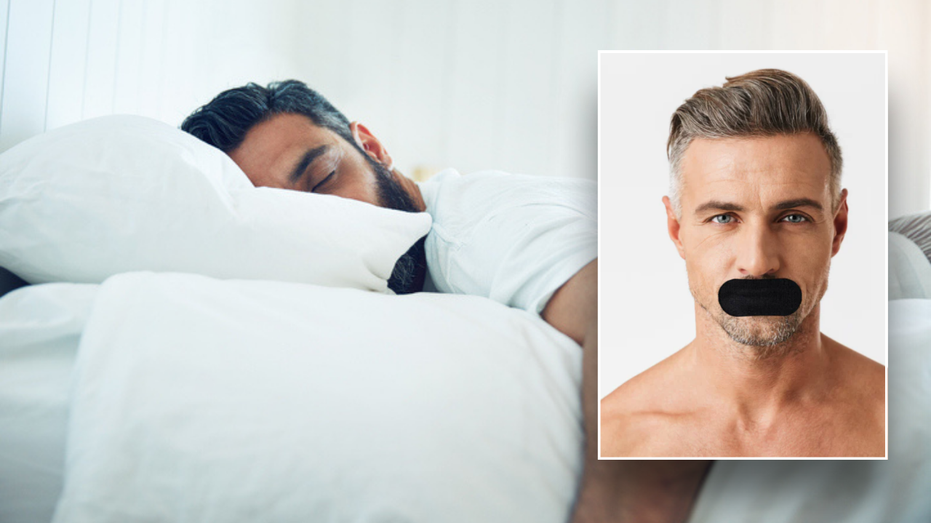
Hostage Tape, a company that sells mouth tapes for sleeping, has become popular on social media for its reported health benefits, but some doctors have concerns.
Videos across social media are touting the benefits of taping your mouth shut while you sleep, but some doctors aren’t convinced.
Hostage Tape, a brand that sells mouth tapes, has gone viral on TikTok for advertising the sleep benefits reportedly associated with its products. In a tongue-in-cheek advertisement viewed nearly 3 million times, the company ironically tells viewers not to use its products.
“Don’t do it. Please don’t tape your mouth while you’re sleeping,” a man in the TikTok video says before listing its benefits. “It’s going to lead to improved sleep, better muscle recovery and a whole lot of other benefits.”
“Just don’t do it. But if you’re wondering how to do it, get your Hostage Tape.”
The video’s comments section was filled with critics and fans alike.
“This stuff is absolutely legit,” one person wrote. “Been taping for about a year and this is the most comfortable and held the best. Transformed my life ‘overnight’ (lol).”
“[A]ll fun and games until u wake up a stuffed nose and sleep paralysis at the same time,” a skeptic wrote.
According to the company’s website, Hostage Tape mouth tape is breathable, hypoallergenic and easy to take off, despite the eerie name associated with it. The tape supposedly trains sleepers to snooze with their mouths closed, and it can be used simultaneously with CPAP machines.
3 WOMEN, AGES 41, 55, 64, SHARE THEIR SECRETS TO BETTER HEALTH, LONGEVITY
“It might seem bizarre, but our body was built to breathe through our noses,” Hostage Tape’s website reads. “Research suggests that most people breathe through their mouths while sleeping.”
“Mouth breathing has also been shown to increase the risk of developing sleep apnea and other medical conditions,” the description adds.
“By applying a flexible and breathable piece of tape, you can prevent mouth breathing and potentially decrease the complications associated with it.”
In an email to Fox News Digital, Hostage Tape said it is endorsed by a large ear, nose and throat clinic in Southern California. The company also sent a doctor’s positive letter about its mouth tape.
“It’s important to emphasize the positive aspect of using Mouth Tape: for individuals who can comfortably close their mouths and breathe softly through their noses without resistance, this product can be a game-changer,” the letter reads. “In most cases, even patients with conditions like a deviated septum can breathe through their noses for prolonged periods, especially during sleep when it’s not a rigorous activity.”
Despite the brand’s reported benefits, Fox News medical contributor Dr. Marc Siegel warned the trend is “dangerous.”
“If the nose or sinuses are clogged or there is an anatomical blockage such as a polyp, a clogged sinus or a deviated septum, it may interfere with complete breathing,” Siegel told Fox News Digital “Mouth breathing is essential as a backup.”
Siegel, who serves as a clinical professor of medicine at NYU Langone Medical Center, said nasal breathing at night does have some health benefits, though. Fox News medical contributor Dr. Janette Nesheiwat shared some of Siegel’s concerns and advised that it should never be used on children.
CLICK HERE TO SIGN UP FOR OUR HEALTH NEWSLETTER
“Some potential serious concerns I have for mouth taping include airway obstruction, difficulty breathing if you have nasal congestion, allergies, or if there is something wrong with your nose that can hinder airflow and become more dangerous at night,” Nesheiwat said. “If you have undiagnosed sleep apnea, and you use mouth tape, it could possibly make your sleep apnea worse by restricting airflow exacerbating the sleep apnea.”
But she added that nasal breathing may be beneficial to overall respiratory health.
“I think it is critical to see [doctors] first for a sleep study test to determine the cause of your symptoms prompting you to try mouth taping,” she said. “I don’t recommend mouth taping as we need to first determine the underlying cause of symptoms.”



